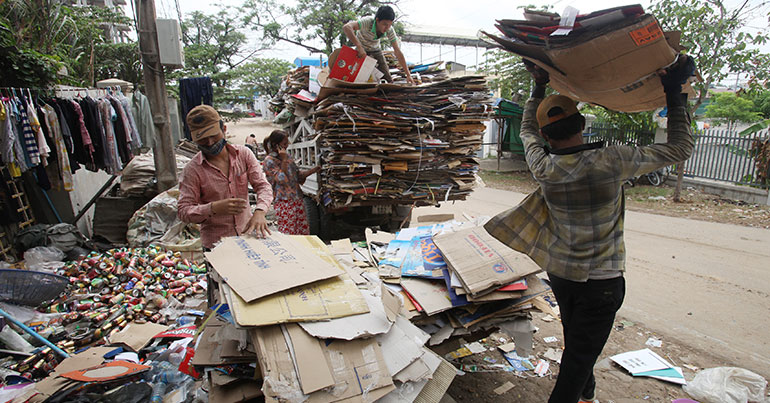Earth Day takes place every year on 22 April, with the intention of raising awareness of plastic pollution. Here, three green experts offer their suggestions on what can be done to reduce environmental damage in Cambodia and around the world

Grace Smith: co-founder, GoGreen Cambodia
Living green is about the mindset, about changing our behaviour to take on a level of consciousness of the impact of our actions. On a daily basis, the greatest change we can create is in our consumerism – how much plastic we consume, whether we dispose of our waste efficiently, dining in places that don’t use plastic straws or that generate sustainable recycling methods.
They say act local, think global. It’s sometimes easy to question whether our small actions will not make a change. But they will, and it’s being proven in Cambodia. Go and buy your reusable cups and coffee containers, take a sturdy bag for the goods when shopping, refuse plastic straws. Start recycling at home. Every little [bit] helps. It’s about civic duty and, most importantly, self respect.
Robert Crocker: deputy director, China Australia Centre for Sustainable Urban Development
Firstly, in my book and elsewhere I argue against ‘consumer scapegoatism’ or ‘individualisation’, which is the business of making us feel guilty or making us focus on our choices at the checkout. I do this because it targets those who cannot influence larger companies that make the decisions and that keep the ‘high carbon’ systems running for their profit. I explain this in terms of ‘sunk costs’ – it takes billions to create a road system, for example, but we identify with our car and imagine that a ‘green’ car can help. It can lower our own footprint, perhaps, but not that of our neighbours.
Most of our footprint is determined by systems. I use the five fingers to explain how this works. Firstly, for the thumb, food: the supermarket and big agriculture, food processing, packaging. [These] are all heavily dependent on fossil fuels. Choosing ‘organic’ products and going vegetarian might drop our footprint there considerably, but not really change the underlying system. Secondly, our index finger – shopping – that is, clothing, appliances etc. These are all based on systems that are typically damaging to the environment and use up a lot of water and other resources. Again, choosing wisely can make a difference, but not that much, given the power of the system to shape our shopping. Thirdly, the built environment – that is, our homes, offices, etc. We can buy solar panels, but our neighbours might not be able to afford to. We can build a greenhouse, but this will not green the city. Fourthly, cars – we ‘own’ our car, but it is totally dependent on the road system, so choosing green won’t change much. Finally, phone – that is, communications, phones, computers, etc. This costs the earth the equivalent of powering Germany, and the materials are often scarce and extremely difficult to get, hence caught up in the politics of the places where they are to be found.
So, in short, we need to get political about this. Our politicians need to understand that systems can only be changed if the ‘sunk cost effect’ is sufficiently resisted to allow for the development of alternatives in each domain. It won’t happen if we all ‘do our own thing’, even if it is a ‘greener’ thing.
Alex Gonzalez-Davidson: director and co-founder, Mother Nature Cambodia
While it is right to blame the Cambodian government for the awful state the country’s nature is in, there is still much that we as individuals can and must start doing. Reducing usage of plastic, [taking] up cycling as a means of transportation, reducing all kinds of waste and cutting down on energy usage at home and at work are just a handful of the many things that people can start doing right now with minimal, if any, negative impacts on their well being.
It is now becoming crystal clear that we really do not have any other choice but to start respecting and protecting the fabulous natural world which we all, as humans, depend on.
Earth Day 2018
What we can do to 'live greener' and effect change, according to experts
Earth Day takes place every year on 22 April, with the intention of raising awareness of plastic pollution. Here, three green experts offer their suggestions on what can be done to reduce environmental damage in Cambodia and around the world

